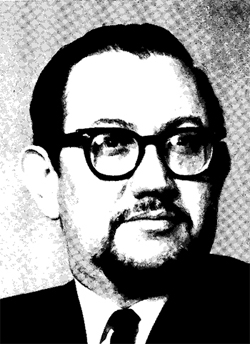Daniel Keyes, Professor of Creative Writing at Ohio University from 1966-90, passed away on June 15.
Keyes arrived at Ellis Hall a year after his first novel—Flowers for Algernon—was published. His story of the mouse named Algernon, a man with an I.Q. of 68, and an experimental procedure to make them both geniuses became a popular staple often read in high school by students who filled his creative writing classes at Ohio University.
Flowers for Algernon earned Keyes a Nebula Award from the Science Fiction Writers of America and a Hugo Award for the short story version.
He followed with fiction novels such as The Touch and The Fifth Sally, and then he turned to creative non-fiction with crime stories based on Ohio.
The Minds of Billy Milligan received a special award from the Mystery Writers of America. He turned it into a play, which was first performed at the Ohio University Playwright Festival in 1983.
He followed with Unveiling Claudia: The True Story of Serial Murder, a saga in which he became a part of the story.
“In 1978, the citizens of Ohio were terrorized by a sensational series of killings—the ‘.22 caliber murders,’” wrote Crime Times, Waldenbooks’ newsletter. “Early in the case, a young woman confessed to three of the murders, proving such exact detail of the scene that she was indicted and jailed. But the killings continued while Claudia was behind bars, and the prosecutors were forced to drop charges against her…. Later, by an apparent stroke of luck, the actual killers were captured and convicted. But the mystery remained: how was Claudia able to give such accurate and convincing information on the crimes she’d confessed to?”
In telling the story of Unveiling Claudia, Keyes became a protagonist. “Part II is a story of me trying to dig out the truth behind the newspaper headlines,” he said in the Crime Times interview.
“Keyes became a detective, figuratively, donning a trench coat as he tried to unravel he true Claudia under the piled up layers of lives he said she told him over the many months that he interviewed her and the people around her,” wrote Robert Powers in a July 18, 1986, Daily Reporter story. “He says that there were times when he was frightened and sometimes even in fear for his life. But he feels satisfied that he did what no one else could: uncover the truth about Claudia.”
A Professor and a Popular Author
He returned to fiction with Trial by Madness, and the creative nonfiction Execution of the Insane. He was awarded a Baker Fund Award in 1986 to continue to explore “the social, radical, legal and ethical issues confronting those who evaluate the condemned insane,” he wrote in his Baker proposal.
Keyes told Crime Times that Ohio University was tremendously supportive and the English Department was “a community of writers.”
Keyes was promoted to full professor in 1971, with then-English Department Chair Frank Fieler noting that Keyes “brought enormous prestige and publicity” to “the best permanent creative writing faculty in the country.”
Author John Thorndike took some creative writing classes at Ohio University while working on his novel Anna Delaney’s Child. He described Keyes to Athens News reporter David Bruce as “a meticulous editor, reads very closely, and criticizes well. He’s everything you want in an editor.”
From Pre-Med to Novelist
“My undergraduate degree is in psychology,” Keyes said in the Crime Times interview. “Actually, I started out pre-med, but I decided I didn’t want to be a doctor. I wanted to be a writer, and yet I said, ‘Well, you’re not going to be able to support yourself as a writer, so you better find a profession.’ So I majored in psychology and did some post-graduate work in pathology at CCNY. Then I changed plans: I got a job as associate fiction editor of a chain magazine, and the writing just took on a life of its own. But I discovered that I always used the psychological education that I got. It seems to be the underpinning of my work.”




















Comments